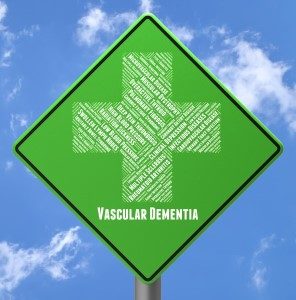Vascular Dementia
Often times at LifeFone we offer tips on exercise, eating more vegetables, and learning new things. You may wonder why? Is it really that important? Yes, it really is. All of these questions can be answered with one answer: To prevent vascular dementia. Vascular dementia is the second most common form of memory loss behind Alzheimer’s, and the symptoms often overlap.

What is vascular dementia? It’s a general term describing problems with reasoning, planning, judgment, memory and other thought processes caused by brain damage and impaired blood flow to your brain.
Inadequate blood flow can damage and eventually kill cells anywhere in your body. The brain has one of the body’s richest networks of blood vessels and is especially vulnerable.
As a caregiver, you are always watching for changes in your loved one’s health and behavior. If your loved one has suffered a stroke, changes in their thinking skills sometimes occur suddenly, as strokes block major brain blood vessels. Thinking problems that may begin as mild changes, could worsen gradually as a result of multiple minor strokes, or other conditions that affect the smaller vessels. Unfortunately, these types of strokes often go unnoticed.
Some of the symptoms include:
- Confusion
- Trouble paying attention and concentrating
- Reduced ability to organize thoughts or actions
- Decline in ability to analyze a situation, develop an effective plan, and communicate that plan to others
- Difficulty deciding what to do next
- Problems with memory
- Restlessness and agitation
- Unsteady gait
- Sudden or frequent urge to urinate or the inability to control passing urine
- Depression
These signs and symptoms don’t necessarily indicate that your loved one has vascular dementia. Though if you are concerned, you should have them checked out by their primary care physician.
Since vascular dementia is directly related to their circulatory system, ensuring that your loved one is maintaining a healthy blood pressure is imperative. Be sure they are having it checked regularly, and that it’s within normal range.
Controlling cholesterol may reduce the risk of vascular dementia. A healthy cholesterol count reduces the amount of plaque deposits inside the brain’s arteries.
If they smoke, encourage them to quit. Smoking damages blood vessels everywhere in the body.
There is good news! According to Framingham Heart Study, a long-term study of over 5,200 participants that began in 1948, there is promise in the idea that making heart-healthy choices may delay or decrease the chances of developing vascular dementia. “It’s very good news,” said Dallas Anderson, an epidemiologist with the National Institute on Aging, part of the National Institutes of Health, which funded the study. “We’re seeing one generation after another where the risk is going down.”
Some studies are showing that there are behavioral changes that are effective in fighting the onset of vascular dementia. Perhaps you can help your loved one make some healthy choices. One major way is to have them socialize. By saying ‘yes’ to going out to eat, to play cards, or to take a walk with friends, they are saying ‘no’ to loneliness, eating alone, depression and lethargy.
At LifeFone we recognize that you want your loved one to maintain their health, even while under your care. Recognizing the symptoms and taking proactive steps to avoid vascular dementia, can help you help your loved one.
FREE BROCHURE Today!
